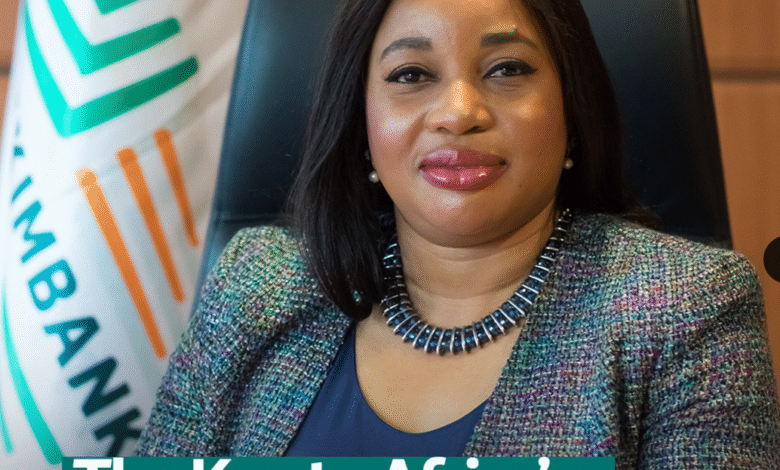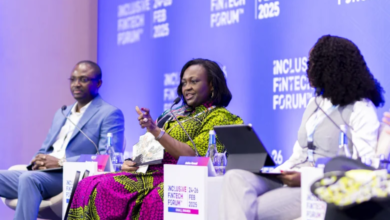Gwen Mwaba: « The Key to Africa’s Economic Integration »
In this Cart’Afrik, Gwen Mwaba, Managing Director of Trade, Finance, and Correspondent Banking at Afreximbank, argues that Africa’s economic integration hinges on trade finance: giving SMEs liquidity and risk-mitigation tools to unlock AfCFTA and pan-African payments. A call for innovative, inclusive financial ecosystems to power a truly integrated market. By Gwen Mwaba*

Many African economists agree that the continent’s economic integration hinges on improving access to trade finance and enhancing its effectiveness. Without robust financial ecosystems to mitigate the risks associated with cross-border commerce, small and medium-size enterprises will be unable to compete in a regional market.
There is no silver bullet for expanding trade and commerce in Africa – or anywhere else, for that matter. But we can say with certainty that trade finance forms the backbone of sustainable growth and economic revitalization on the continent. It is critical for promoting the integration of African economies and drawing a line under postcolonial fragmentation, which is essential for enabling small and medium-size enterprises (SMEs) to grow and diversify.
By strengthening their ability to export, import, and invest with confidence, African countries can unlock their vast potential
By strengthening their ability to export, import, and invest with confidence, African countries can unlock their vast potential and bolster their resilience in an increasingly uncertain world. The continent’s leaders have already taken steps toward achieving these goals. By the end of 2023, intra-African trade reached $192.2 billion, up from $186.3 billion the previous year, partly owing to an increase in trade finance.
That number is expected to rise with the continued implementation of the African Continental Free Trade Area, which became operational in 2021. To date, 49 countries have ratified the AfCFTA Agreement, demonstrating their commitment to eliminating intracontinental trade barriers.
Many African economists believe continental integration and strategic autonomy hinge on improving access to trade finance, enhancing its effectiveness, and adopting innovative measures. These changes would also help African countries compete in global markets by providing the liquidity and risk-mitigation tools that businesses need to weather currency fluctuations, political instability, and other challenges related to cross-border transactions.
Africa’s current share of global trade is less than 3% – most of which is merchandise trade – and yet it has one of the world’s fastest-growing economies
Africa’s current share of global trade is less than 3% – most of which is merchandise trade – and yet it has one of the world’s fastest-growing economies, with GDP growth predicted to rise to 4% in 2025. There is clearly room for expanding its trade frontiers.
But securing new trade opportunities requires addressing Africa’s limited banking infrastructure and high transaction costs. To reduce costs, increase transparency, and expand access to underserved SMEs, the continent’s trade-finance sector must embrace mobile banking and digital payment platforms.
One promising development on this front is the growth of the Pan-African Payment and Settlement System. In three years, 17 central banks and more than 150 commercial banks have joined the platform, which was developed by Afreximbank (where I work), the African Union, and the AfCFTA Secretariat.
The lack of innovative financial instruments, including supply-chain finance, trade credit insurance, and export factoring, also keeps many African businesses on the sidelines, unable to mitigate the risks associated with cross-border commerce. Providing SMEs with these tools would empower them to participate more actively in regional and global markets, which would create jobs and promote diversification.
Scaling up solutions that are inclusive, technologically advanced would help close Africa’s trade-finance gap, which Afreximbank puts at around $100 billion
Scaling up solutions that are inclusive, technologically advanced, and aligned with the United Nations’ Sustainable Development Goals would help close Africa’s trade-finance gap, which Afreximbank puts at around $100 billion. Crucially, this could set in motion an important shift in the continental economy. Africa currently imports all sorts of products and services from the rest of the world that could just as easily originate at home. If we can get more trade finance to those who need it, African-made equivalents could supplant foreign imports, fostering the continent’s economic growth and sustainable development.
Moreover, building robust financial ecosystems that help SMEs enter regional and global markets would complement, and possibly spur, investments in infrastructure like ports, roads, and digital networks. To be sure, the continent’s infrastructure investment needs are enormous: between $130 billion and $170 billion annually, according to Afreximbank’s research. But meeting them is the only way Africa can fully realize its economic potential.
By creating blended finance structures that de-risk private investments, expanding access to concessional finance, and forming a unified, pro-African voice in global finance, African economies and private institutions can work together to create meaningful, lasting change
To do so, African governments must develop partnerships with private-sector actors and development-finance institutions. In addition to sharing expertise and creating enabling environments for innovative trade-finance products, these stakeholders could work together to reform the global financial architecture. By creating blended finance structures that de-risk private investments, expanding access to concessional finance, and forming a unified, pro-African voice in global finance, African economies and private institutions can work together to create meaningful, lasting change.
Trade finance – the “silent engine” of development – has the potential to accelerate Africa’s economic integration. But for that to happen, African leaders must recognize that innovative and inclusive financial practices are vital and remain committed to them even as other challenges arise.
*Gwen Mwaba is Managing Director of Trade, Finance, and Correspondent Banking at Afreximbank






